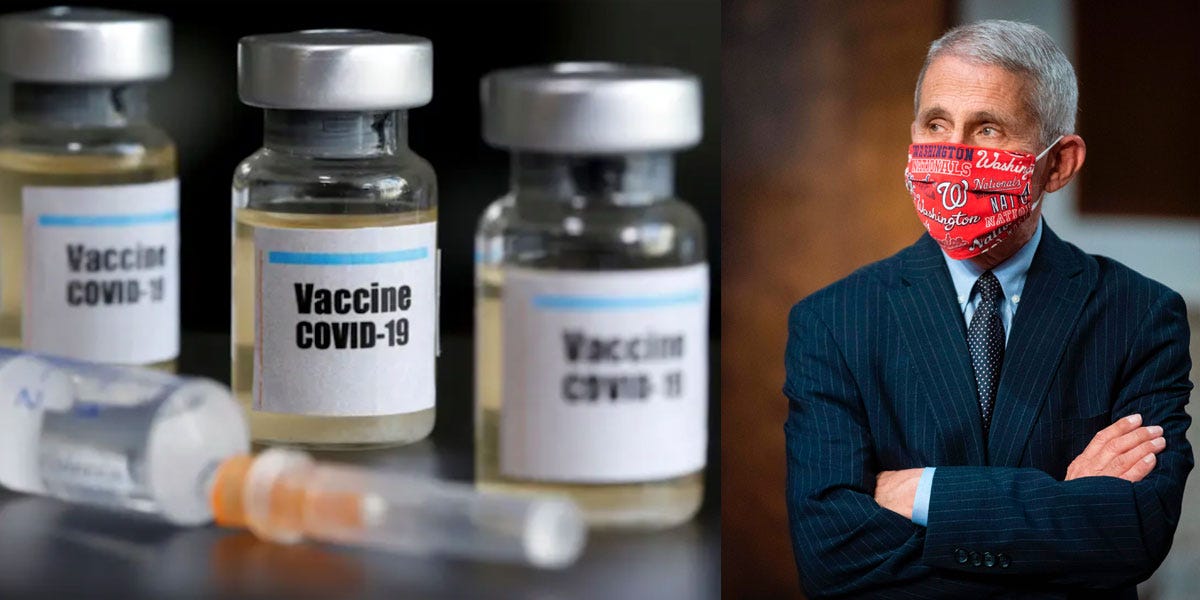
Reuters, Al Drago/AFP via Getty Images
- There won’t be just one coronavirus vaccine “winner,” but hopefully 4 or 5, Dr. Anthony Fauci told Rashida Jones on the new podcast she hosts with Bill Gates.
- Gates and Fauci agreed that some vaccines may be more effective in certain populations than others.
- Each vaccine may also vary in how effectively it prevents transmission of the virus, which will be “confusing,” Gates said.
- Gates and Fauci — old friends who speak every few weeks — said we will need multiple vaccines to eradicate the virus on a global scale before any one country can completely return to normal.
- Visit Business Insider’s homepage for more stories.
There are now two promising coronavirus vaccines on the horizon, with pharmaceutical company Moderna announcing today an initial analysis found its vaccine to be 94.5% effective in preventing COVID-19.
The news comes a week after Pfizer announced its experimental coronavirus vaccine was found to be more than 90% effective.
While neither vaccine is FDA-approved and the findings are preliminary, the reports are encouraging developments in the global fight against the novel coronavirus, even for other contenders in the vaccine race.
“The plan is that we have more than one winner,” Dr. Anthony Fauci said on the first episode of a new podcast hosted by Microsoft founder Bill Gates and actress Rashida Jones.
But that doesn’t mean they’ll all work equally well for everyone. Rather, some may be more effective in certain populations than others.
"There may be one vaccine that seems to work better in the elderly than in the young, and one may work better in children than it works in the elderly," Fauci, the nation's top infectious disease expert, said. "When you learn that, and it will take some time to learn that, you may have more of a selective distribution, depending on the demographic group."
Gates said the vaccines may also vary in how effective they are at preventing transmission; right now, we don't know if either the Pfizer or Moderna vaccine checks that box.
"There are some vaccines for other diseases that are fantastic at blocking transmission," the billionaire philanthropist said. "For this one, we're going to be learning even for a few months after we get the vaccine out exactly how strong that characteristic is. Some of the vaccines may be better at that than others which, that'll be confusing."
Without global vaccination efforts, life in any one country can't completely return to normal
Multiple safe and effective vaccines also means a swifter rollout across the globe, the duo said on the podcast, "Bill Gates and Rashida Jones Ask Big Questions."
"We really have a responsibility ... not only the United States, but all the countries that are wealthy countries to get as many players in as possible so that you can actually get enough vaccine for everyone and anyone who needs it," Fauci said. "If you only have one winner, they're not going to make it. I want to see four winners, five winners."
Supporting all countries in vaccinating their citizens is critical for life to truly resume to normal in the US, Fauci and Gates, who compare notes every few weeks, emphasized.
"If we have the disease elsewhere in the world, it's not clear to me we can go back and do big sports events or open up the bars because like Australia or South Korea, the risk of reinfection will be looming out there," Gates said. "So as long as it's in the world, I'm not sure we'll be completely back to normal."
Fauci agreed, adding that it's going to be a slow process because the vaccines won't be 100% effective and given to 100% of the population. By contrast, if you have a vaccine that, for instance, is 75% effective and given to 69% of the population, "you still have a lot of infection that has the capability of spreading."
That means "back to normal" is far away, but closer to normal is in reach — if people continue to wear masks, avoid crowded places, keep their distance from others, and practice good hand hygiene.
"We're going to get closer and closer to normal," Fauci said, "namely [through] a combination of the protective effect of the vaccine and a moderate degree of public health measures."

